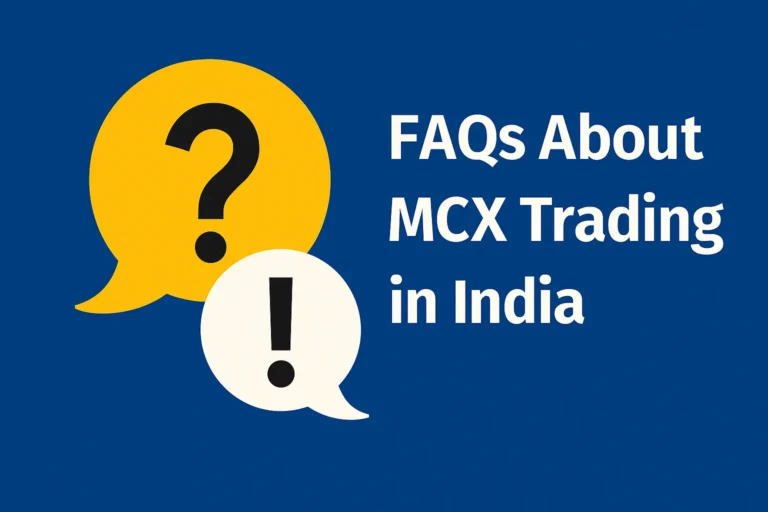Glossary of Key MCX Trading Terms
Commodity trading on MCX (Multi Commodity Exchange of India) involves unique terminology that beginners must understand to trade effectively. Whether you’re starting out or looking to brush up your knowledge, this glossary covers the most commonly used MCX trading terms and their meanings.
MCX Trading Glossary (A to Z)
1. Ask Price
The lowest price at which a seller is willing to sell a commodity futures contract.
2. Bid Price
The highest price a buyer is willing to pay for a commodity futures contract.
3. Base Metals
Group of commonly traded industrial metals like Copper, Zinc, Lead, Aluminium, and Nickel.
4. Bullion
Precious metals such as Gold and Silver traded on MCX.
5. Commodity Derivatives
Financial contracts that derive value from the price of an underlying physical commodity like gold, crude oil, or natural gas.
6. Contract Expiry
The last trading day of a futures contract. After this, the contract is either settled in cash or delivered physically (if allowed).
7. Crude Oil
A major energy commodity traded on MCX, known for high volatility and trading volume.
8. Delivery-Based Settlement
Involves actual delivery of the physical commodity at contract expiry. However, most MCX contracts are cash-settled.
9. Futures Contract
An agreement to buy or sell a commodity at a fixed price on a future date. All MCX instruments are traded in futures.
10. Hedging
A risk management strategy used to protect against adverse price movements in the commodity markets.
11. Initial Margin
The minimum amount you must deposit with your broker to open a futures position.
12. Intraday Trading
Buying and selling commodity contracts within the same trading session to profit from short-term price movements.
13. Leverage
The ability to trade larger positions than your capital through borrowed funds or margin.
14. Lot Size
The standardized quantity of a commodity in a futures contract. For example, 100 grams for Gold Mini or 1 barrel for Crude Oil Mini.
15. Mark-to-Market (MTM)
Daily adjustment of account balance based on the profit or loss from open positions.
16. Margin Call
A broker’s demand for additional funds when your account balance falls below the maintenance margin.
17. MCX (Multi Commodity Exchange)
India’s largest commodity derivatives exchange regulated by SEBI.
18. Natural Gas
A popular energy commodity known for high price volatility and fast movements.
19. Open Interest
The total number of outstanding contracts that have not been settled. It indicates market activity and liquidity.
20. Position
Your exposure to a particular commodity, either long (buy) or short (sell).
21. Settlement Price
The official closing price used to calculate MTM and final settlement.
22. Spot Price
The current market price of the physical commodity.
23. Stop-Loss Order
An order to automatically close a position if the price reaches a specified loss level, helping limit potential losses.
24. Trading Hours
MCX operates in two sessions:
- Morning: 9:00 AM – 5:00 PM
- Evening: 5:00 PM – 11:30/11:55 PM (depending on the commodity)
25. Volatility
The rate at which the price of a commodity changes. High volatility = greater risk and reward potential.
FAQs
Why is it important to learn MCX terms?
Understanding key terms helps traders make informed decisions, interpret charts, and manage risk effectively.
Are these terms used across all brokers?
Yes, these are standard terms used across all SEBI-registered MCX brokers and platforms.
Is futures trading the only form on MCX?
Currently, MCX primarily offers futures trading. Options trading has been introduced on select commodities.
Do I need to memorize all terms before trading?
Not necessarily, but knowing the commonly used terms will make your trading experience smoother and more confident.
Where can I practice these terms?
Many brokers offer demo trading platforms or paper trading features where you can apply these terms without real money.


